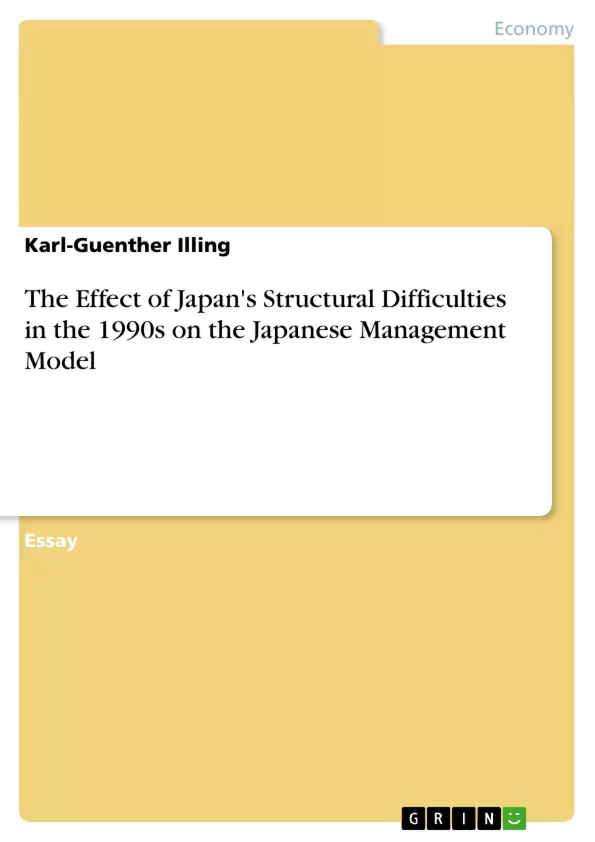In the decades after the second World War the Japanese economy experienced
phenomenal growth. Western academics and press have often praised
the Japanese management model as a major success factor for the “Japanese
miracle”. Many have called for the adoption of Japanese practices in
Western firms in order to remain competitive against the Far-Eastern counterparts.
But in the 1990s the burst of the bubble economy and the resulting recession
have lead to a change in the view on Japanese management practices.
Many now see the Japanese model as outdated and ready for a thorough
overhaul.
This essay explores in how far the problems and structural changes that Japan
experienced over the last ten to fifteen years have necessitated a radical
change in her management practices. After briefly introducing the Japanese
management model in the second section, several social and economic developments
are discussed that might have a lasting impact in the management
practices. The fourth section examines and explains observations made
about the actual effect on Japanese management in the face of these developments.
Finally, the essay concludes that, while incremental adjustments are
taking place, rather than a radical change or, indeed, a westernisation of
Japanese management, a more fundamental rethinking might take place in
the future.
Inhaltsverzeichnis (Table of Contents)
- Introduction
- The Japanese Management Model
- A Changing Context for Japanese Management in the 1990s
- Radical Change or Incremental Adjustment?
- Conclusion
Zielsetzung und Themenschwerpunkte (Objectives and Key Themes)
This essay explores the extent to which the economic and structural challenges faced by Japan in the 1990s led to a fundamental shift in its management practices. It investigates whether these changes necessitated a radical overhaul of the traditional Japanese management model or if they resulted in more incremental adjustments.
- The evolution of the Japanese management model
- The impact of economic and social changes on Japanese management
- The effectiveness of traditional Japanese management practices in the face of new challenges
- The potential for radical change or incremental adjustment in Japanese management
- The influence of global economic trends on Japanese management practices
Zusammenfassung der Kapitel (Chapter Summaries)
- Introduction: This chapter introduces the topic of the essay, outlining the context of the Japanese economy in the post-war period and the subsequent changes that occurred in the 1990s. It highlights the debate surrounding the effectiveness of the Japanese management model.
- The Japanese Management Model: This chapter provides a comprehensive overview of the Japanese management model, discussing its key elements such as lifetime employment, seniority-based wages, and consensus decision-making. It explores the interrelated nature of these practices.
- A Changing Context for Japanese Management in the 1990s: This chapter examines the social and economic factors that shaped the Japanese context in the 1990s, including the bursting of the bubble economy, demographic shifts, and globalization. It assesses how these changes potentially impacted management practices.
- Radical Change or Incremental Adjustment?: This chapter delves into the actual effects of the changing context on Japanese management, examining the extent to which companies adapted their practices. It analyzes whether these changes represented a radical overhaul or more incremental adjustments.
Schlüsselwörter (Keywords)
The essay focuses on the Japanese management model, its key features, and the impact of structural changes in the 1990s on its evolution. Key terms include lifetime employment, seniority-based wages, consensus decision-making, the bursting of the bubble economy, globalization, and radical change versus incremental adjustment. The essay also examines the relationship between Japanese management practices and economic performance, specifically in the context of the 1990s economic slowdown.
Frequently Asked Questions
What was the "Japanese Miracle" in management?
It refers to the phenomenal post-WWII economic growth attributed to unique management practices like lifetime employment and consensus decision-making.
How did the 1990s recession affect Japanese management?
The burst of the "bubble economy" led many to view traditional practices as outdated, sparking a debate on whether a radical overhaul or "Westernization" was necessary.
What are the key pillars of the traditional Japanese management model?
The model is built on lifetime employment, seniority-based wages, and "Ringi" (consensus-based) decision-making.
Did Japanese firms adopt a radical Western model in the 2000s?
The essay concludes that while incremental adjustments took place, there was no radical Westernization; instead, firms opted for gradual internal changes.
What social factors pressured the Japanese management system?
Key factors included demographic shifts (an aging population), globalization, and the need for increased flexibility in a stagnant economy.
- Citar trabajo
- Karl-Guenther Illing (Autor), 2003, The Effect of Japan's Structural Difficulties in the 1990s on the Japanese Management Model, Múnich, GRIN Verlag, https://www.grin.com/document/19601



